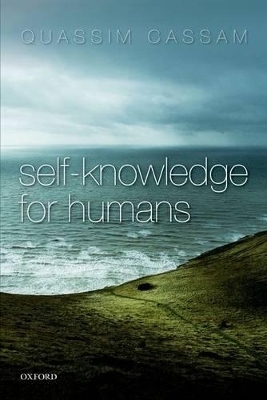
Self-Knowledge for Humans
Seiten
2016
Oxford University Press (Verlag)
978-0-19-877668-0 (ISBN)
Oxford University Press (Verlag)
978-0-19-877668-0 (ISBN)
Humans are not model epistemic citizens. Our reasoning can be careless, our beliefs eccentric, and our desires irrational. Quassim Cassam develops a new account of self-knowledge which recognises this feature of human life. He argues that self-knowledge is a genuine cognitive achievement, and that self-ignorance is almost always on the cards.
Human beings are not model epistemic citizens. Our reasoning can be careless and uncritical, and our beliefs, desires, and other attitudes aren't always as they ought rationally to be. Our beliefs can be eccentric, our desires irrational and our hopes hopelessly unrealistic. Our attitudes are influenced by a wide range of non-epistemic or non-rational factors, including our character, our emotions, and powerful unconscious biases. Yet we are rarely conscious of such influences. Self-ignorance is not something to which human beings are immune.
In this book Quassim Cassam develops an account of self-knowledge which tries to do justice to these and other respects in which humans aren't model epistemic citizens. He rejects rationalist and other mainstream philosophical accounts of self-knowledge on the grounds that, in more than one sense, they aren't accounts of self-knowledge for humans. Instead he defends the view that inferences from behavioural and psychological evidence are a basic source of human self-knowledge. On this account, self-knowledge is a genuine cognitive achievement and self-ignorance is almost always on the cards.
As well as explaining knowledge of our own states of mind, Cassam also accounts for what he calls 'substantial' self-knowledge, including knowledge of our values, emotions, and character. He criticizes philosophical accounts of self-knowledge for neglecting substantial self-knowledge, and concludes with a discussion of the value of self-knowledge.
This book tries to do for philosophy what behavioural economics tries to do for economics. Just as behavioural economics is the economics of ^homo sapiens, as distinct from the economics of an ideally rational and self homo economics, so Cassam argues that philosophy should focus on the human predicament rather than on the reasoning and self-knowledge of an idealized homo philosophicus.
Human beings are not model epistemic citizens. Our reasoning can be careless and uncritical, and our beliefs, desires, and other attitudes aren't always as they ought rationally to be. Our beliefs can be eccentric, our desires irrational and our hopes hopelessly unrealistic. Our attitudes are influenced by a wide range of non-epistemic or non-rational factors, including our character, our emotions, and powerful unconscious biases. Yet we are rarely conscious of such influences. Self-ignorance is not something to which human beings are immune.
In this book Quassim Cassam develops an account of self-knowledge which tries to do justice to these and other respects in which humans aren't model epistemic citizens. He rejects rationalist and other mainstream philosophical accounts of self-knowledge on the grounds that, in more than one sense, they aren't accounts of self-knowledge for humans. Instead he defends the view that inferences from behavioural and psychological evidence are a basic source of human self-knowledge. On this account, self-knowledge is a genuine cognitive achievement and self-ignorance is almost always on the cards.
As well as explaining knowledge of our own states of mind, Cassam also accounts for what he calls 'substantial' self-knowledge, including knowledge of our values, emotions, and character. He criticizes philosophical accounts of self-knowledge for neglecting substantial self-knowledge, and concludes with a discussion of the value of self-knowledge.
This book tries to do for philosophy what behavioural economics tries to do for economics. Just as behavioural economics is the economics of ^homo sapiens, as distinct from the economics of an ideally rational and self homo economics, so Cassam argues that philosophy should focus on the human predicament rather than on the reasoning and self-knowledge of an idealized homo philosophicus.
Quassim Cassam is Professor of Philosophy at the University of Warwick. He was previously Knightbridge Professor of Philosophy at Cambridge, and has also taught at Oxford and UCL. He is the author of Self and World (OUP, 1997), The Possibility of Knowledge (OUP, 2007) and, with John Campbell, Berkeley's Puzzle: What Does Experience Teach Us? (OUP, 2014).
Preface
1: Homo Philosophicus
2: The Disparity
3: Substantial Self-Knowledge
4: Self-Knowledge for Philosophers
5: Reality Check
6: Psychological Rationalism
7: Normative Rationalism
8: Predictably Irrational?
9: Looking Outwards
10: Looking Inwards
11: Self-Knowledge and Inference
12: Knowing Your Evidence
13: Knowing Yourself
14: Self-Ignorance
15: The Value of Self-Knowledge
Bibliography
Index
| Erscheinungsdatum | 01.11.2016 |
|---|---|
| Verlagsort | Oxford |
| Sprache | englisch |
| Maße | 158 x 235 mm |
| Gewicht | 396 g |
| Themenwelt | Geisteswissenschaften ► Philosophie ► Erkenntnistheorie / Wissenschaftstheorie |
| Geisteswissenschaften ► Philosophie ► Metaphysik / Ontologie | |
| Geisteswissenschaften ► Psychologie | |
| ISBN-10 | 0-19-877668-3 / 0198776683 |
| ISBN-13 | 978-0-19-877668-0 / 9780198776680 |
| Zustand | Neuware |
| Haben Sie eine Frage zum Produkt? |
Mehr entdecken
aus dem Bereich
aus dem Bereich
die Grundlegung der modernen Philosophie
Buch | Softcover (2023)
C.H.Beck (Verlag)
18,00 €
Buch | Softcover (2023)
Reclam, Philipp (Verlag)
7,00 €

![Was heißt Denken?. Vorlesung Wintersemester 1951/52. [Was bedeutet das alles?] - Martin Heidegger](/media/113619842)
